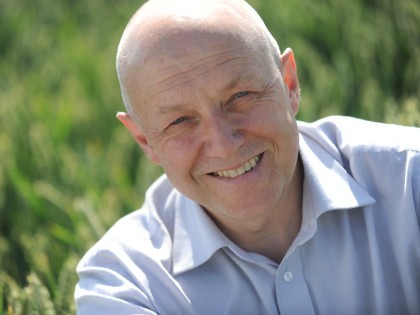
Andy’s work at NIAB began in 2005, when incoming CEO Prof. Wayne Powell recruited Andy to oversee a new focus on genetic research that represented NIAB’s biggest strategic change since privatisation. Andy joined NIAB as a highly experienced, well-respected crop biotechnology lead, following many years working with Zeneca/Syngenta.
With support from the NIAB Trust, this timely new initiative assembled a team of experienced scientists to stamp NIAB’s presence in UK crop genetics at a time when BBSRC was redressing the balance of its research portfolio to include more crop research. The new NIAB ‘Genetics and Breeding’ department was set up, with specific strengths in crop transformation, quantitative genetics and cereal pre-breeding.
Creating 'superwheat'
Andy’s new research teams were immediately successful, securing BBSRC Crop Science Initiative funding for three major projects covering starch biosynthesis in cereal grains, multi-parent ‘MAGIC’ populations, and the potential of resynthesised wheat for capturing valuable novel diversity. These formed the basis of much of the pre-breeding work that followed until health issues hastened his retirement in 2016.
In particular, the work with resynthesised wheat grabbed the attention of funding bodies and the public alike. Early NIAB success in pre-breeding with CIMMYT resynthesised wheat gave unexpectedly strong positive results leading to headlines across the world, with BBC Countryfile’s Tom Heap coining the term ‘Superwheat’, and a nomination for Prof Greenland’s team in the prestigious ‘BBSRC Innovator of the Year’ competition.
Crucially, it also led to NIAB’s inclusion in BBSRC’s public-good wheat prebreeding programmes ‘WISP’, ‘Designing Future Wheat’ and new iteration ‘Delivering Sustainable Wheat’. Through these, NIAB have developed thousands of novel UK-adapted pre-breeding lines, the best of which are starting to appear in the pedigrees of elite UK varieties. Six years after his retirement, another NIAB team award (Finalists in the 2022 BBC Food and Farming Awards) was for Andy as much as for anyone else.
Prof Greenland’s approach drew on his understanding of the needs of commercial R&D, and most of NIAB’s pre-breeding work has been in collaboration with commercial breeding companies.
A lasting legacy
This was also the case for his other major legacy, NIAB’s outstanding Crop Transformation group, which was built up around the skills, know-how and expertise of a crack team of tissue culture and molecular biology specialists embraced by NIAB when commercial companies retreated from UK-based R&D in this area.
With Andy at the helm, this small team were soon successful in attracting funding for major projects including the Community Resource for Wheat Transformation project – which provided wheat transformation capacity to the UK plant science community. Through working with many academic researchers and commercial customers, this rapidly growing group has consistently delivered high quality results at high efficiencies and now covers a range of species, offering both GM and genome editing approaches.
A quietly spoken but effective advocate, Andy leaves a lasting legacy: the science base and ethos of NIAB’s crop genetic research, the host of talented leaders he has trained and mentored, and an example of how effective inclusive, collective, collaborative leadership can be. Universally well-liked, warm-hearted and generous (at least, off the 5-a-side football pitch!), Andy showed a genuine interest in the wellbeing of others, he leaves NIAB and all those who worked with him in a better place than he found it.
